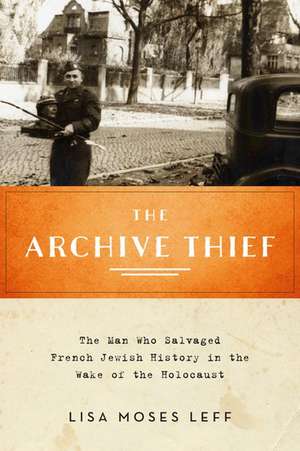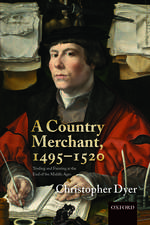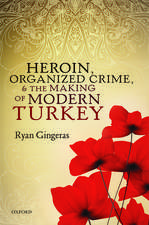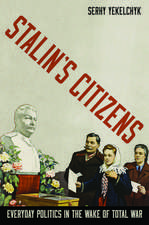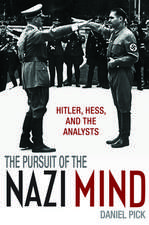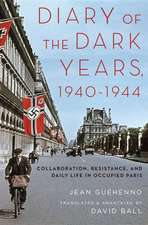The Archive Thief: The Man Who Salvaged French Jewish History in the Wake of the Holocaust: Oxford Series on History and Archives
Autor Lisa Moses Leffen Limba Engleză Hardback – 19 aug 2015
| Toate formatele și edițiile | Preț | Express |
|---|---|---|
| Paperback (1) | 122.63 lei 10-16 zile | |
| Oxford University Press – 16 aug 2018 | 122.63 lei 10-16 zile | |
| Hardback (1) | 226.65 lei 10-16 zile | |
| Oxford University Press – 19 aug 2015 | 226.65 lei 10-16 zile |
Preț: 226.65 lei
Nou
Puncte Express: 340
Preț estimativ în valută:
43.37€ • 45.40$ • 35.89£
43.37€ • 45.40$ • 35.89£
Carte disponibilă
Livrare economică 04-10 martie
Preluare comenzi: 021 569.72.76
Specificații
ISBN-13: 9780199380954
ISBN-10: 0199380953
Pagini: 304
Ilustrații: 12 illustrations
Dimensiuni: 241 x 157 x 19 mm
Greutate: 0.6 kg
Editura: Oxford University Press
Colecția OUP USA
Seria Oxford Series on History and Archives
Locul publicării:New York, United States
ISBN-10: 0199380953
Pagini: 304
Ilustrații: 12 illustrations
Dimensiuni: 241 x 157 x 19 mm
Greutate: 0.6 kg
Editura: Oxford University Press
Colecția OUP USA
Seria Oxford Series on History and Archives
Locul publicării:New York, United States
Recenzii
[A] riveting portrait of an enigmatic scholar and a reflection about the construction of archives...[A] richly researched, lucidly written and, ultimately, deeply moving book...Lisa Moses Leff has made an invaluable contribution to the expanding literatures on postwar communal reconstruction and Jewish cultural restitution.
The Archive Thief is a richly researched, lucidly written and, ultimately, deeply moving book... The book is all the more engaging that its author is able to situate Szajkowski's actions within the context of postwar discussions about the rightful ownership of archives. Finally, Leff makes a very persuasive argument about the ambiguous legacy of Szajkowski's collecting and sales.
Looking at the title of this compelling monograph, the reader could be forgiven for wondering how a man could possibly be both a thief and a saviour. The paradox within this question is answered skilfully by Moses Leff, who has very successfully woven together a detective story which is underpinned by a serious academic examination of the nature and purpose if archives, their content and the question of ownership. ... An intriguing read.
[an] engrossing and painstakingly documented book. Her [Leff's] research was made all the more demanding by the fact that there is no way of knowing all that is actually missing from collections.
Entertaining and very well written, this is an invaluable contribution to the historiography on French Jewry in the modern era.
Through Szajkowski's personal biography, Leff has illuminated the larger story of how Jewish archives and libraries were constructed and reconfigured in the aftermath of World War II, as the centers of gravity in the Jewish world shifted from Europe to Israel and the United States ... Leff casts new light on this transformative moment in postwar Jewish life. As a result of her beautifully written and deeply researched book, we have a greater appreciation of the degree to which the libraries and archives on which we depend are themselves "historical artifacts". In this sense, Leff's thought-provoking and imaginative book raises questions that will intrigue all historians. This work also constitutes a fitting tribute to a man who, despite his flaws and weaknesses, made immense contributions to the field of Jewish history.
[A] superb book ... Pages fly by as her meticulous and surprising study of the extraordinary life of her "hero" keeps her reader breathless ... an astonishing work of history, founded on a group of original documents by means of which she raises fundamental questions about the very nature of the archive as it fluctuates between being a state memoir and a way to preserve a particular history and culture.
[A] brilliant new book ... Leff has produced a page-turning account that offers a model for how post-Holocaust Jewish history should be written. The work ponders questions that should interest both specialist and generalist readers and ought to be assigned widely and debated extensively.
Lisa Moses Leff tells Szajkowski's fascinating story in a book as gripping as a crime novel, with profound insight into the role played by archive collections in the modern construction of national histories Leff creates a complex portrait of this 'archive thief,' who was no simple villain Szajkowski's story is stunning and Leff tells it exceptionally well. The Archive Thief is a meticulously researched scholarly work that deftly incorporates archival sources, Szajkowski's published writings, and his private correspondence. It is beautifully written and sophisticated without ever becoming pedantic.
The Archive Thief is a richly detailed and sympathetic portrait that unfolds with elements of a detective story In writing about the trajectory of Szajkowski's life and career, she raises provocative questions about the nature of collecting, the role of archives and where they belong, and the very writing of history.
A work of learned detection and a history of the making of history, this absorbing study is also a portrait of, perhaps, the oddest of all creators of modern Jewish scholarship. A shy, roguish, charming man, self-taught, an erstwhile Communist and fighter in the French Foreign Legion, Zosa Szajkowski's jagged, complex life is explored in this work with perceptiveness, and commendable empathy.
With her dogged research, keen analysis and scintillating writing, Lisa Leff in The Archive Thief marries historical scholarship with the detective genre. The story of Zosa Szajkowski could have been -- and maybe still will be -- the stuff of a great mystery novel, played out on multiple continents, with a perplexing villain who sometimes seems like a hero. But instead Lisa Leff has used these details to show the complex work done by archives and the deep ideological meaning associated with the documents of the past.
Why did an accomplished Jewish historian steal tens of thousands of historical documents? In unraveling that mystery, Lisa Moses Leff has created a compelling personal portrait, while at the same time elucidating key issues of Jewish history and historiography in the aftermath of the Holocaust. Meticulously researched and beautifully written, The Archive Thief is more than just a fine work of scholarship; it is also a page-turner.
Leff, in this deeply researched and intriguing book, draws a nuanced portrait of a scholar who turned to crime to preserve his status as a historian of modern Jewish history.
The Archive Thief is a richly researched, lucidly written and, ultimately, deeply moving book... The book is all the more engaging that its author is able to situate Szajkowski's actions within the context of postwar discussions about the rightful ownership of archives. Finally, Leff makes a very persuasive argument about the ambiguous legacy of Szajkowski's collecting and sales.
Looking at the title of this compelling monograph, the reader could be forgiven for wondering how a man could possibly be both a thief and a saviour. The paradox within this question is answered skilfully by Moses Leff, who has very successfully woven together a detective story which is underpinned by a serious academic examination of the nature and purpose if archives, their content and the question of ownership. ... An intriguing read.
[an] engrossing and painstakingly documented book. Her [Leff's] research was made all the more demanding by the fact that there is no way of knowing all that is actually missing from collections.
Entertaining and very well written, this is an invaluable contribution to the historiography on French Jewry in the modern era.
Through Szajkowski's personal biography, Leff has illuminated the larger story of how Jewish archives and libraries were constructed and reconfigured in the aftermath of World War II, as the centers of gravity in the Jewish world shifted from Europe to Israel and the United States ... Leff casts new light on this transformative moment in postwar Jewish life. As a result of her beautifully written and deeply researched book, we have a greater appreciation of the degree to which the libraries and archives on which we depend are themselves "historical artifacts". In this sense, Leff's thought-provoking and imaginative book raises questions that will intrigue all historians. This work also constitutes a fitting tribute to a man who, despite his flaws and weaknesses, made immense contributions to the field of Jewish history.
[A] superb book ... Pages fly by as her meticulous and surprising study of the extraordinary life of her "hero" keeps her reader breathless ... an astonishing work of history, founded on a group of original documents by means of which she raises fundamental questions about the very nature of the archive as it fluctuates between being a state memoir and a way to preserve a particular history and culture.
[A] brilliant new book ... Leff has produced a page-turning account that offers a model for how post-Holocaust Jewish history should be written. The work ponders questions that should interest both specialist and generalist readers and ought to be assigned widely and debated extensively.
Lisa Moses Leff tells Szajkowski's fascinating story in a book as gripping as a crime novel, with profound insight into the role played by archive collections in the modern construction of national histories Leff creates a complex portrait of this 'archive thief,' who was no simple villain Szajkowski's story is stunning and Leff tells it exceptionally well. The Archive Thief is a meticulously researched scholarly work that deftly incorporates archival sources, Szajkowski's published writings, and his private correspondence. It is beautifully written and sophisticated without ever becoming pedantic.
The Archive Thief is a richly detailed and sympathetic portrait that unfolds with elements of a detective story In writing about the trajectory of Szajkowski's life and career, she raises provocative questions about the nature of collecting, the role of archives and where they belong, and the very writing of history.
A work of learned detection and a history of the making of history, this absorbing study is also a portrait of, perhaps, the oddest of all creators of modern Jewish scholarship. A shy, roguish, charming man, self-taught, an erstwhile Communist and fighter in the French Foreign Legion, Zosa Szajkowski's jagged, complex life is explored in this work with perceptiveness, and commendable empathy.
With her dogged research, keen analysis and scintillating writing, Lisa Leff in The Archive Thief marries historical scholarship with the detective genre. The story of Zosa Szajkowski could have been -- and maybe still will be -- the stuff of a great mystery novel, played out on multiple continents, with a perplexing villain who sometimes seems like a hero. But instead Lisa Leff has used these details to show the complex work done by archives and the deep ideological meaning associated with the documents of the past.
Why did an accomplished Jewish historian steal tens of thousands of historical documents? In unraveling that mystery, Lisa Moses Leff has created a compelling personal portrait, while at the same time elucidating key issues of Jewish history and historiography in the aftermath of the Holocaust. Meticulously researched and beautifully written, The Archive Thief is more than just a fine work of scholarship; it is also a page-turner.
Leff, in this deeply researched and intriguing book, draws a nuanced portrait of a scholar who turned to crime to preserve his status as a historian of modern Jewish history.
Notă biografică
Lisa Moses Leff was born in Washington D.C. She attended Oberlin College and received her PhD from the University of Chicago. She is the author of Sacred Bonds of Solidarity: The Rise of Jewish Internationalism in Nineteenth-Century France. She is now Professor of History at American University where she is also affiliated with the Jewish Studies Program.
